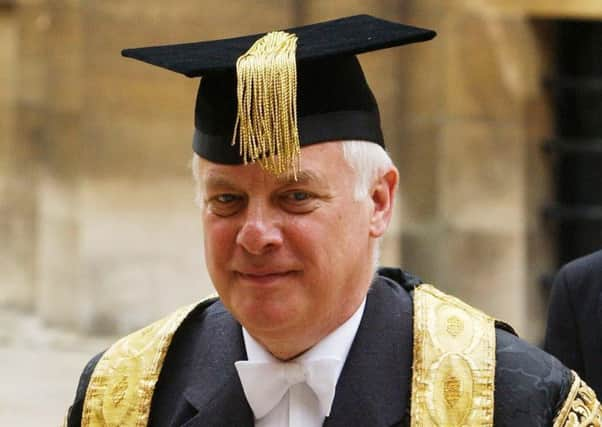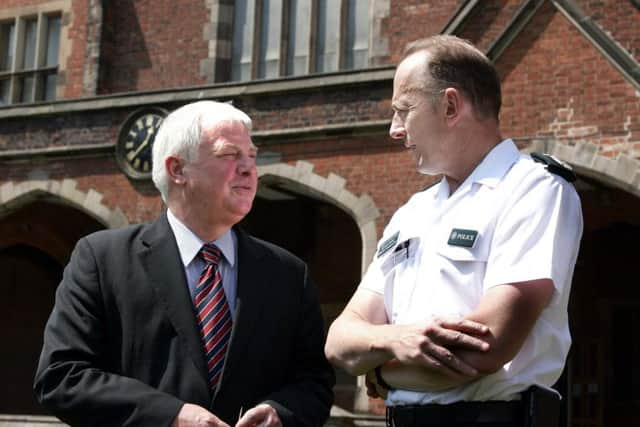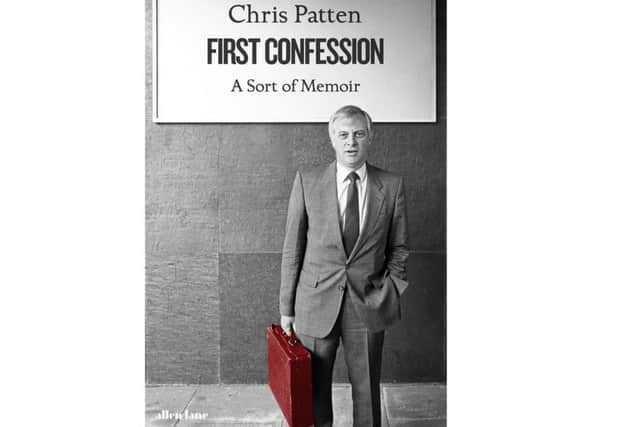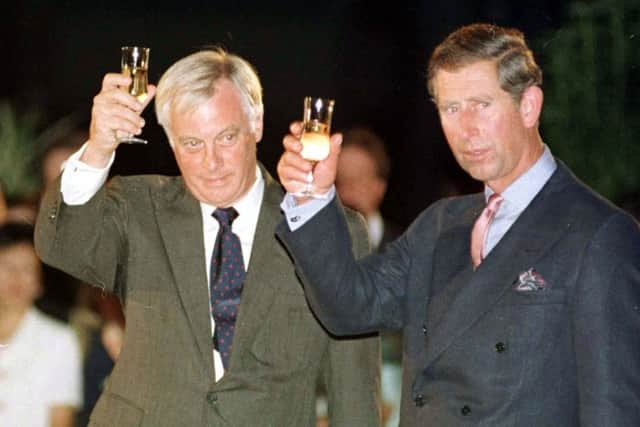Book review: nothing superior about Patten's error-ridden and tedious memoir


“My name is George Nathaniel Curzon/I am a most superior person/My cheeks are pink, my hair is sleek/I dine at Blenheim twice a week.”
So goes a rhyme current at Balliol, Oxford in the 1870s. George Nathaniel Curzon was indeed a most superior person. The son of a baron, he rose to the rank of marquess; the inheritor of one of the grandest of Georgian houses, he inhabited a palace as Viceroy of India; an undergraduate at Balliol, he became a fellow of All Souls and, later still, chancellor of Oxford; he was foreign secretary after the Great War; only the office of prime minister eluded him.
Advertisement
Hide AdAdvertisement
Hide AdChris Patten, a Balliol man 90 or so years after Curzon, did not dine at Blenheim; he grew up in the suburbs rather than in a Derbyshire mansion; and although he is now, as Curzon once was, chancellor of his university, he was never a fellow of All Souls; the post of foreign secretary as well as that of prime minister did not fall to him; he was governor of Hong Kong, not master of the subcontinent; he is a life peer, not a marquess.


And yet Chris Patten is, as the relentlessly de haut en bas tone of this autobiography shows, a most superior person.
But has he written a most superior memoir in ‘First Confession’? It is sometimes claimed that Norman Fowler’s ‘Ministers Decide’ is the dullest of all political autobiographies but ‘First Confession’ must come close in terms of tedium.
If you want to read about his conversation with a Swedish passenger on board ship to the United States or of how he saw paper boys at work in Buffalo, then this book is for you.
Advertisement
Hide AdAdvertisement
Hide AdElegant prose or the amusing or illustrative anecdote are both missing. Patten’s chief contribution to the political lexicon is the ugly phrase “double whammy”; it is not astonishing that here he resorts lazily to that only too ubiquitous (and misused) adjective “iconic”.


Superiority does not preserve Chris Patten from blunders.
Sir David Keir, the master of Balliol when Patten was an undergraduate, was not an Ulsterman (though he was for 10 years vice-chancellor of Queen’s University) but was instead born in Northumberland, the son of a Scot.
He is under the impresion that the G.P.O. in Dublin was seized during the Easter Rising because the rebels wanted to prevent the posting of pay cheques to Irish soldiers in the British Army.
Sir Basil Brooke’s remarks about not employing Catholics were not made in 1937.


The Orange Order was not founded in Portadown.
Lady Dufferin does not live in Clandeboys [sic].
Advertisement
Hide AdAdvertisement
Hide AdPresident Reagan can hardly have supposed that Roy Jenkins’s chef de cabinet (chief of staff) as president of the European Commision was really his cook as Jenkins left Brussels before Reagan was inaugurated.
A well-informed reader of this book will wonder who Chris Patten really is.


He is a Catholic and a Conservative but there is little sign here of any deep attachment to either the principles of his party or the teachings of his church.
He does not mention the story occasionally told in articles by the journalist Petronella Wyatt that in his last year at Balliol he applied to both Transport House (then the Labour Party headquarters) and to the Conservative Research Department, accepting the latter only because it replied first.
Advertisement
Hide AdAdvertisement
Hide AdIn this context it seems fitting that his father’s favourite Groucho Marx saying was the one to the effect that these are my principles and if you don’t like them, I’ve got others.
Patten’s Catholicism is still more opaque than his political affiliation; he seems happiest questioning his church’s teachings, including those on abortion.
Chris Patten is connected with Northern Ireland in two ways. He was parliamentary under-secretary at the Northern Ireland Office from June 1983 to September 1985; and in 1999 he produced his report into policing in the Province.
Readers may well be interested in the Northern Ireland section of his book above all.
Advertisement
Hide AdAdvertisement
Hide Ad

Some of what Patten writes about Northern Ireland could fit into Sinn Fein’s An Phoblacht with little alteration. It is not surprising to learn that he plagued Sir David Keir at Balliol by singing republican songs underneath his bedroom window. His hatred for unionism and Ulster Protestants is made clear.
Protestants, he writes, “looked as though they owned the place. And so they did”.
“The main idea of religion in some unionist homes”, we are told, “was simply to tell the Bishop of Rome to piss off”.
He writes of “the tawdry pageantry of Protestant dominance in Northern Ireland”.
Advertisement
Hide AdAdvertisement
Hide AdHe compares Orange Order parades to dogs cocking “their legs against favourite lamp posts”.
On this matter at least Patten would get on well with Gerry Adams and Michelle O’Neill, let alone Jeremy Corbyn and John McDonnell.
It is revealing that his account of his report into policing fails to mention the 319 RUC officers murdered during the Troubles – 40 of them while he served at the Northern Ireland Office. (His term included – though he does not trouble to say so – the IRA mortar attack on the RUC station in February 1985 in which nine officers were murdered).
He does not say why there were so few Catholics (generally around 8%) in the RUC; the reason was terrorist intimidation. He also fails to note that the proportion of Catholics in middle ranks was usually twice that of their presence in the force as a whole.
Advertisement
Hide AdAdvertisement
Hide AdPatten claims that his report was well received “except by some members of the police service and loyalist [sic] politicians led by David Trimble”.
Would it not be as true to say that the report was generally badly received except by nationalist politicians?
Patten’s distaste for David Trimble – a man more erudite and honourable than he will ever be – is also obvious.
He writes that Lord Trimble went through “the usual pantomime tricks of refusing to shake my hand and so on. I am prepared to believe that he is a nicer man than he seems”.
Advertisement
Hide AdAdvertisement
Hide AdGiven the damage Patten’s report did to the RUC, to Trimble’s leadership of his party and to the stability of the structures of the Belfast Agreement settlement, a refusal to shake Patten’s hand on Trimble’s part seems restrained. But Patten’s remarks are also somewhat disingenuous.
In ‘The Hugo Young Papers’ – the book which records the private interviews the late Guardian columnist had with politicians and public figures – there is an interesting account of Young’s conversation with Chris Patten on June 26 1999, while the latter was still preparing his policing report.
Trimble, Patten told Young, had gone as far as he could; so much was clear to him from his tours around Northern Ireland to inquire into attitudes to the police. (We must suppose Young’s account is accurate as Patten praised the book in a review for The Guardian). Some weeks before the report was published The Observer carried an article claiming the RUC’s name and symbols were to be retained. It is hard to avoid the impression that unionists – David Trimble above all – were being lulled into a sense of security about the report in advance of its publication.
Trimble’s angry response to the report when it did appear was not a piece of pantomine but genuine and justified.
Advertisement
Hide AdAdvertisement
Hide AdThe abiding message of ‘First Confession’ is that superiority isn’t what it used to be.
• C.D.C. Armstrong is a writer and historian
• First Confession: A Memoir by Chris Patten, is published by Allen Lane, £20